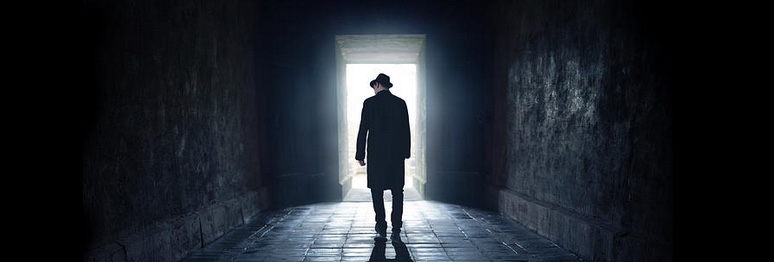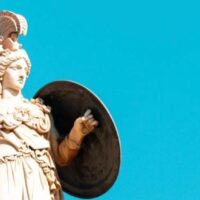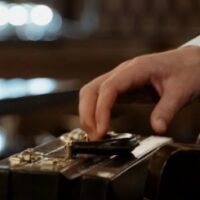Image courtesy of Lee Avison.
I can still recall the empty streets of Madrid as I walked them those many years ago. It is a beautiful place where all the world seems to meet on its cobbled streets, baroque architecture side-by-side with the remains of the Muslim Walls and domed basilicas, all the while the modern streets of Plan Castro can be seen stretching off to the horizon.
It was, while I was there, though, marred with government propaganda, posters that anthropomorphized the ill that was sweeping the country. I must admit that these ghastly images of specters feeding on the dying had the intended effect – they kept most of the city’s populous indoors. This was a boon to me, as when the plague had swept the countryside, farmers and laborers had flooded to the capitol, filling its beautiful streets with the filthy and ignorant. But now they fled behind whatever door would have them.
I thought they had brought their ignorance and superstitions with them from the countryside, infecting the proletariat as those unfortunate few who lived in their dirty tenements succumbed to the plague. The only evidence that they still lived in the city was their drying laundry strung from window to window.
I remained indoors most days, happy to be be among my books and studies. At night, though, when the only sound seemed to be the vibrations of the overhead electric lines, I would step out. The incandescence of the street lamps cast long shadows down the city’s narrow alleys, making the patrols easy to avoid.
I luxuriated in the emptiness, in the city’s crisp, dry air, breathing it in as I tapped along with my silver-topped cane. And I did so, happily, most often heading west from my apartment, towards the metropolis’ medieval heart.
Until one night, when I paused for some diversion or other, I noticed a figure had done what I thought impossible – he had made his way into my isolated presence without notice. I say ‘he’ because he was obviously a man, dressed in the masculine fashion of the day, wearing a homburg hat with a slightly curled brim and a hip-length jacket. I could distinguish nothing else of him, though, as he was still some distance away, silhouetted by the street lamps.
I raised my hand to greet him, a fellow nocturnal sophisticate, but stopped, unexpectedly trepidatious. I had not caught him mid-stride or skulking about, for he stood without movement at the mouth of the alley, facing me fully. Was he a plain clothes detective? A patrolman sweeping up those breaking quarantine? If he was, he made no move toward me. I could discern no more detail about him, though.
Worried that to give no greeting would make me appear irrational, I attempted to smile, but felt it falter, a broken command of my own face. I raised my arm to wave, but felt it weak, barely lifting the hand. When both of these failed me, I attempted to move toward him, but halted when my feet encounter a bloated sac, like a rotted eggplant. All of my limbs’ leaden inaction left me, though, when the sac squeaked and I realized the number of rats running about my feet.
Dignity abandoned, I leapt back, nearly tripped over my cane as I twisted myself around to flee towards where I had entered the alley. I only regained my normal stride and poise after making a distance away from the strange figure onto a well-lit broadway.
I slept fitfully that night, but the next day, fortified by a mid-afternoon nap and an evening brandy, I stepped out onto the streets again. The city was much the same as before, clean and empty, and I smiled as I began to cross the Bridge of Toledo, walking from the Pyramids roundabout to the Marqués de Vadillo Square. I smiled in the pools of light cast by the bridge’s lamps, the realm so quiet that one could hear the slow traveling of the Manzanares’ waters.
This silence, though, was replaced with a steady thunder, as I stopped to see the man in the Homburg at the other end of the bridge. Again, he did not move, which made no sense, for after all, is that not the purpose of a bridge, to move from one end to another? Yet, he only stood there, again nothing but a shadow backlit by street lamps.
I resisted the urge to turn back east, feeling conscious how such a sudden change in direction must appear, but the thunder refused to let my feet move forward. I stood, paralyzed, my feet pivoting underneath me, unable to go forward or back.
This continued until the figure did what it had not done before – it moved. Slowly, implacably, he moved forward. I watched, listening to the thunder, until the shade passed by one of the bridge’s many lamps and the light of it revealed no more about him than the dark. I watched, feeling myself rooting to the spot, as he passed by another lamp and another and he remained the same as before, nothing but a negative outline, a dark shade with nothing to it but its inexorable movement towards me.
I realized the rhythmic roar was not in the atmosphere, but the beating of my heart in my chest. I felt the blood move to my limbs and I used it to flee, back across the bridge, down Calle Cuesta, nearly fleeing past my home. I fumbled with my keys until I gained entrance. So frightened was I upon entrance that I hid myself in my closet, the thundering of my heart like the echoing of the stranger’s footsteps outside the door.
When I awoke in the closet the next day I was startled to find myself tangled in the my ties and suspenders. I set about my day, continuing to chuckle, mocking myself at the imagined ignorance of the shadowed figure. I moved through my studies and learning, fortifying myself in these things, pretending I was better than the other city inhabitants who hid indoors.
I did these things, building my confidence with them as well as too much drink, until I dressed in my best suit, wrapped a scarf around my neck and took my silver cane in hand. I saluted myself in the apartment’s mirror and stepped out my door.
It was waiting for me in the hallway. Solid black despite the corridor’s modern bulbs, it stood so dark near the stairs that I know I would have seen it if the path had been as lightless as a new moon night. I dropped my cane and fled back inside my apartments so quick I only left the flapping of my scarf behind me.
Much time has gone by since then. Even after seeing the laundry of the peasants reeled in off lines and hearing the laughter and talk of normal life return to the streets, I dare not leave my home again to visit my beloved city. Many kind people, those who bring me food or new books, assure me that no figure stands outside my door.
But I know they’re wrong.
See the author’s published work here.
Related Posts
Unknown Correspondence Next Post:
The American: Chapter 46
























